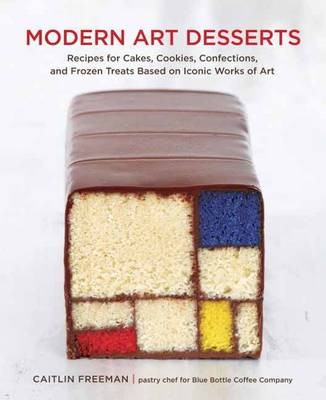Of cakes and copyrights
June 10, 2016 by Darcie
You may remember an interesting cookbook from a few years ago, Modern Art Desserts, that featured art-inspired cakes from the San Francisco Museum of Modern Art (SFMOMA) by baker Caitlin Freeman of the Blue Bottle Café, housed in the museum. Freeman’s café lost the contract with SFMOMA following its renovations in 2013. But the art-inspired cakes have remained, much to the baker’s chagrin.
“It stings because I felt like I was doing something for beauty and for love,” Freeman says. “I’m just so bummed that the SFMOMA didn’t want me and my future inspiration back.” She feels that the new café’s bakers haven’t added anything new to the designs, but have merely copied her ideas. While Freeman is disappointed in the museum’s decision to continue to make cakes that strongly resemble her works, she can’t really do anything about it.
“Recipes are not copyrightable, nor are methods of cooking, and ideas are never copyrightable. So the idea of making desserts inspired by artworks could not be copyrighted,” says Los Angeles intellectual property attorney Naomi Beckman-Straus. “However, there is no clear reason why the visual appearance of a dish could not be copyrighted,” she adds. This angle has never really been pursued.
Freeman doesn’t have any plans to sue SFMOMA, but the situation highlights the difficulties that bakers and chefs face when they attempt to protect new recipes they have developed. While a food publication (whether a blog, cookbook, or magazine) can copyright the verbiage that accompanies a recipe, including the instructions, the protection does not extend to the ingredients, quantities, or methods of preparation. For example, while Dominique Ansel can trademark the Cronut name, he cannot stop others from creating a product similar to it as long as they call it something else.
Judging from the comments that accompany the NPR article, public opinion is divided on whether SFMOMA should have let the art-inspired desserts go along with the restaurant’s lease. Some people believe it is an insult to Freeman while others feel the museum has a solid claim to the treats since Freeman created them under the auspices of the institution. What do you think about the situation?
Categories
- All Posts (6940)
- Antipasto (2135)
- Author Articles (247)
- Book News (935)
- Cookbook Giveaways (983)
- Cookbook Lovers (257)
- Cooking Tips (109)
- Culinary News (299)
- Food Biz People (552)
- Food Online (791)
- Holidays & Celebrations (272)
- New Cookbooks (149)
- Recipes (1500)
- Shelf Life With Susie (231)
- What's New on EYB (133)
Archives
Latest Comments
- kmwyman on Rooza by Nadiya Hussain – Cookbook Review and Giveaway
- Maryd8822 on The Golden Wok – Cookbook Giveaway
- Dendav on Danube Cookbook Review and Giveaway
- sanfrannative on Rooza by Nadiya Hussain – Cookbook Review and Giveaway
- darty on Danube Cookbook Review and Giveaway
- Atroyer7 on Danube Cookbook Review and Giveaway
- demomcook on What foods do you look forward to the most for each season?
- demomcook on Danube Cookbook Review and Giveaway
- Darcie on How cookbooks can help build resilience
- mholson3 on Danube Cookbook Review and Giveaway